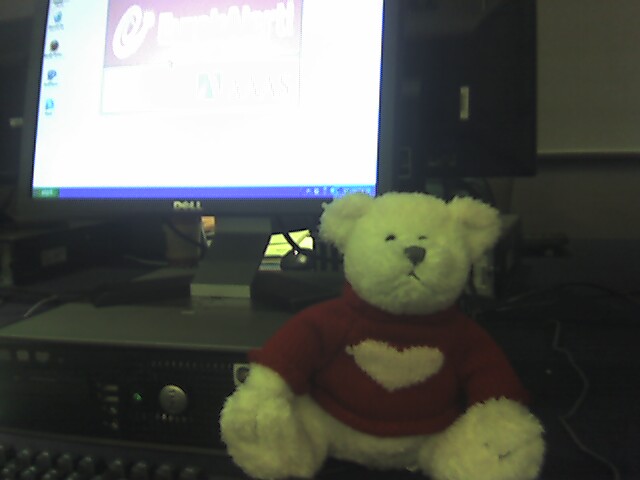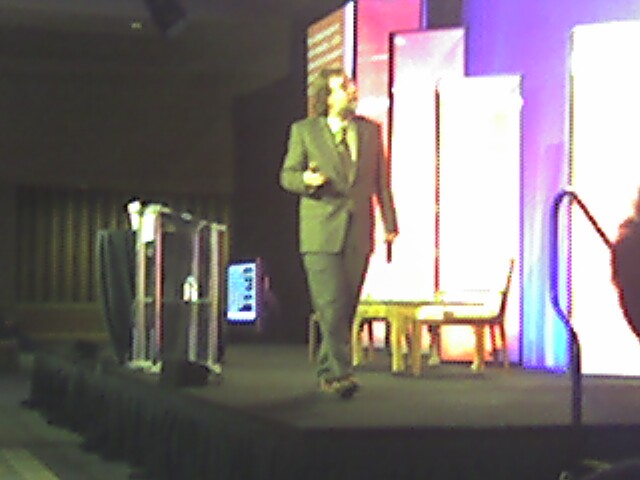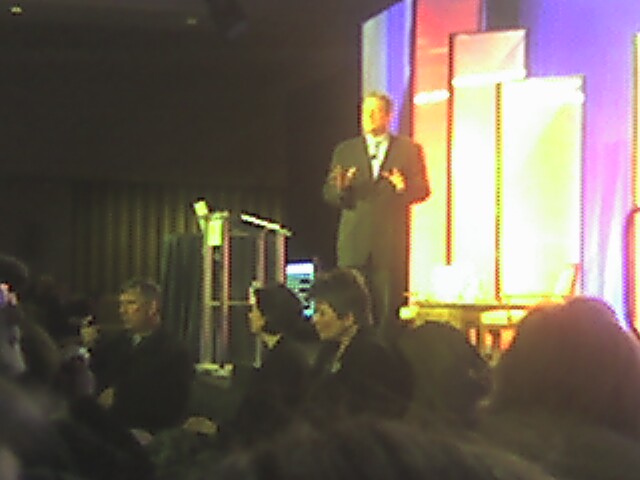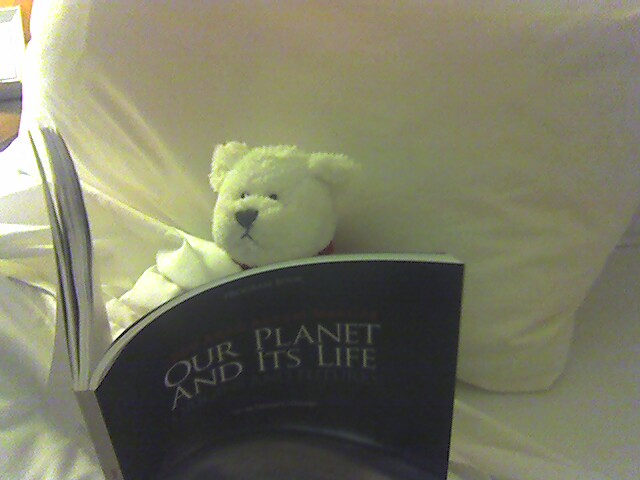Yes, to Chicago in February. In two hotels that are not connected. Obviously this is a cost-saving measure, though it seems likely none of the savings AAAS made were passed on to members, who paid the same cost as usual.
The good thing about flying in a bad economy is you can get a first class upgrade pretty easily - they want cash. It used to be they were practically giving away frequent flier miles in cereal boxes so getting an upgrade was more of a challenge because everyone had them and even being a premier flier didn't help. I can recall one time pre-2001 when my flight was late (Chicago, coincidentally) and the ticket agent got on to announce they would not have early boarding for premier members because there were more premier fliers than regular ones.
Not so today. It's a lot different. For one thing, at the United counter in Sacramento, there was only one ticket agent. The only real choice was a computerized check-in. How do I schmooze a ticket agent into getting an upgrade with no agent to schmooze? It's great for those people who would rather pay too much for a Saturn car so they don't have to negotiate with a car dealer but for people like me, who like to exercise some individual initiative and beat out one of those blustering fat businessmen with a sense of entitlement, it's a little disappointing. Of course, schmoozing is a crap shoot too - you sometimes don't know until the last minute if you get the free upgrade. Now, for a quick swipe of the credit card I can upgrade my cheapie ticket for less than 10% of what I would have paid to fly first class.
Getting a cheap upgrade is the good thing. The bad thing is planes look like they just came out of a DMZ. That's so airline companies let you know they are not wasting money, even though we know they are.
I am not sure of the necessity of turning airplane flight in America into a third world country experience but first class is not really better than coach these days. It's a bigger seat but there were no scientists up there that I noticed. Maybe they took an earlier flight.
The flight took off late but was only slightly late arriving. Not too bad - it's leaving O'Hare that I have never had a flight be on time. O'Hare is too far to take a cab and trains in America are even worse than airplanes so I looked for a shuttle. The sign at the counter said "$2 discount if you can name a favorite love song" , presumably because it was counting down to Valentine's Day, so I told the young lady "Silly Love Songs" by Paul McCartney and she didn't know what that was - it's good to be old - so I sang it for her and then she recognized it and was charmed enough at my willingness to sing it she gave me the $56 round trip ticket for $42.
You see? Individual initiative. A computer checking me in would not have done that. I would just have been some fool middle aged man singing to a machine.
I get to the hotel, the Fairmont Chicago, and the room is spectacular. I don't know if I got a better room because I registered through AAAS as a journalist (a good room avoids journalists there to write about the meeting instead writing about their lousy hotel room), if everyone else stayed at the Hyatt so there were good rooms here or if all the rooms are this nice but, if they are, Fairmont Chicago is worth the money.
The only downside is I see no real lounge area of any size - just a small wine bar - and the room service menu is somehow better than the menu of the restaurants they have. At a conference like this, I want to know what people are thinking about and talk in a relaxed setting, not in crowded conference rooms. So that will take some work.
I get up early because I hadn't checked in at the conference yet and wanted to attend the European breakfast for the press and see what they had to say. As you guess, we carry a lot of content from Europe and it isn't just because we have a good sized audience outside the US, it's also because the outreach by European organizations is a lot stronger. Good luck getting anything out of AAAS news service. We had a journalism intern last summer who wrote to their Eurekalert group to get on their news release list and a really stupid person at Eurekalert wrote her back to tell her because many of you are researchers, it would be "insider trading" for a journalist to have access to an embargo'ed release.
I am sure I know more about the '34 Act that created the SEC than everyone at AAAS combined so I thought about writing Alan Leshner to inquire why the non-profit, member-funded AAAS I pay to support was in the business of selling securities and, if the non-profit AAAS is actually not using our member fees to be a market maker in the securities, why someone stupid at Eurekalert would put AAAS in legal peril by alleging they are, but I held back; even last summer the SEC had its hands full so I let it go. We get our press releases directly from researchers, too many to count every day, so Eurekalert is irrelevant, but it gives you some idea why European science organizations are more liked by me and probably others. They want their research to get noticed and if I ask for a graphic or an interview, we get it right away. No hoopie or dumb employees trying to sound important.
So I got up at 6:30 to get my press badge (quick and flawless, thanks AAAS) and went off to breakfast where I listened to an interesting talk on what Europe is doing, what they are funding and how they want to work with Americans. The "Research for Europe" hardcover book they gave out is worthy of any coffee table, though at something like this I worry many will be thrown away.
After breakfast I visited talks of varying quality (this is, after all, the kind of meeting where a few years ago a whole panel on the benefits of chocolate was staffed by researchers funded by Mars, Inc.) but was most impressed by University of Virginia researcher Craig Dukes and his talk on the LHC and Tevatron, which inspired something I'll write an article about later (note: and did, though oddly I was able to finish that article before this blog, since this blog could not be done until the day was over) and then it was off to the reporter lounge for free coffee where I met a pair of authors who had written a climate change book for middle school aged kids and they agreed to write something up for us using some of their pictures.

Bloggy Bear, cup reporter, in the AAAS reporter room. His wee beady eyes bore into me until I write something. Photo: Hank Campbell
I then went to a panel on making a book pitch to companies, which was a group of publishers I never heard of wanting everyone to stand up for 2 minutes and throw out a proposal. No offense to anyone small but when we do a book, and we will, it will either be with a big publisher that can generate some marketing power or we can just do a very high quality self published one and sell it for $50 a copy ourselves. So I didn't stay long.
I then went to a panel on 'Science in Entertainment' and that was more interesting. They had a number of people in various aspects of the entertainment field, one who had done a book of interviews with science advisors on lots of movies and one who had been science advisor on "The Big Bang Theory" television show. Like me, they seem to agree that science in film and television has gotten a lot more credible in the last decade and they made an excellent point in saying that scientists helping out movies do best when advisors negotiate accuracy in its context - realism can be darn expensive and science needs to add dramatic tension and not be the replacement for entertainment.
I then had a half hour to go back to my hotel and see Prof. Sean Carroll give the plenary lecture, on Darwin. As always, he was insightful and entertaining and made fine points. Like me, he thinks that the recent trend of Darwin denialists inside biology are in error and he embraces the rich legacy of a brilliant naturalist. His talk had far too much to go into a blog piece and he'll have his new book coming out of soon anyway.

Sean Carroll at the AAAS meeting. Photo: Hank Campbell
After Carroll's talk I had about 45 minutes until Al Gore's keynote address - but I started to leave and saw a literal sea of humanity waiting outside and knew I would never get back in. So I sat back down and waited and had a nice conversation with an astronomer who was a physics teacher at a state college in Vermont - the American Physics Teachers (I believe) is the name of the other organization hosting its conference at the same time.
Al Gore arrived to the sort of rapturous applause you expect from an academic audience in a city that voted 73% for him in his last election. While I don't think the politicization of global warming has done more good than harm (all publicity is good publicity thinking aside) he certainly gives a terrific talk. If he had been as relaxed and confident and funny in 2000 as he is now, rather than the Al Gore that became a caricature, he would have won the Presidential election quite easily.
The problem with Gore is that you always feel like you have to fact check everything in way you never have to do with Carroll. He was more modest in front of this audience than he is otherwise; saying things like "Scientists tell me..." rather than putting things as fact, but he still uses some factoids in his presentations (a 20 foot rise in oceans? No source visible for that bizarre claim, but I was the only one with eyes bugging out) that would not slip by an audience less politically in sync with him. But I don't want to be too hard on him because we may want him to write here.

All those people you see in front of Gore are doing sign language. I don't know why they needed so many people to do sign language and they would rotate every 2-3 minutes. Sign language was not such hard work back in the day. This is on my little Treo 1MB camera phone, I am actually pretty close. Photo: Hank Campbell
My choices after Gore's departure were the Annals of Improbable Research meeting or the "Dance my PhD" contest. The dancing PhD's contest was a shuttle ride away and the Ig Nobel stuff was in my hotel so I went to that instead. I chose poorly. It was funny in the beginning but probably belonged in a smaller venue during the day, since it was all a rehash of older stuff and was more suited to people buying tickets specifically to see their stuff. Operas about science aren't all that great to a serious audience.
So 13 hours of AAAS later I was back in the room planning what I would do tomorrow, with Bloggy helping. That's good because there is a lot of good content to get to during the day so it requires some optimization.

Bloggy does not like to monkey around when it comes to tomorrow's schedule. He is a stern taskmaster. Photo:Hank Campbell
On to Day 2.



Comments